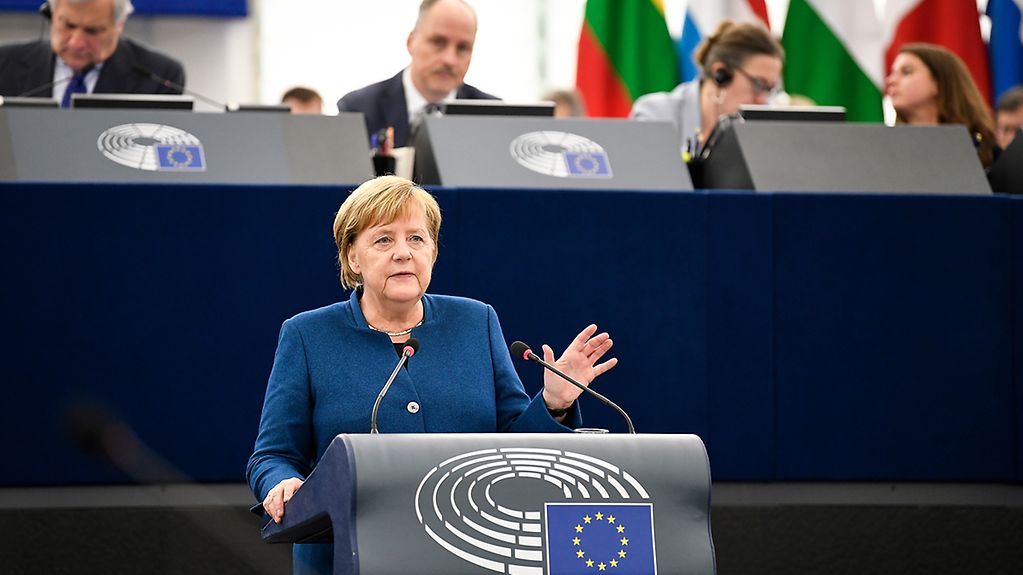Speech in front of the European Parliament
Chancellor Merkel has called for tolerance and solidarity in Europe. Europe must be strong, resolute and effective where it is needed, she declared in a speech before the European Parliament in Strasbourg. Angela Merkel also supported the idea of a European army.

Chancellor Angela Merkel speaks in front of the European Parliament on the future of Europe
Photo: Bundesregierung/Kugler
"Europe is our best chance of ensuring lasting peace, lasting prosperity and a safe and secure future," said Chancellor Angela Merkel.
The celebrations this weekend to commemorate the end of the First World War have once again brought home to us what happens when institutions, like the League of Nations that was founded in the wake of the Great War, fail. "What came after was much worse."
And that is why nationalism and egotism must never again be allowed to take root in Europe, she underlined. "That is why we must not throw away this European opportunity. We owe it to ourselves, we owe it to the past generation, and we owe it to future generations."
Tolerance is Europe’s soul
Angela Merkel looked back at the first speech she gave in the European Parliament back in 2007. In it she said that tolerance was an indispensable and fundamental value that underpins the European idea. This soul of Europe has had a rough ride over the last few years, she stated – with the sovereign debt crisis, international terrorism and wars, as well as displacement and migration.
Against this background it is increasingly important for Europe to stand together. "It is always more difficult to stand up for your interests alone on the global stage."
It is only with tolerance that the will can be developed to understand the interests and needs of others as one’s own needs. And without European solidarity, which is based on precisely this tolerance, successful action is inconceivable. This is what makes Europe strong, for three reasons:
1. Solidarity is a universal value and an integral part of the European treaties and of European DNA. As an example Angel Merkel pointed to reciprocal assistance in the face of natural disasters, nuclear accidents and economic crises.
2. Solidarity always goes hand in hand with responsibility for the entire community. "Whoever undermines rule-of-law principles and the freedom of the press in their own country, jeopardises the rule of law not only in their own country but for all of us throughout Europe," stressed Angela Merkel. Self-critically she noted that Germany has not always been able to distance itself from national egotism either – in the run-up to 2015 it took far too long to accept that the refugee issue was an issue for all member states of the European Union.
3. Solidarity to benefit all parties also means acting in your own best interests. Angela Merkel gave the example of cooperation with African countries in the fight against displacement and migration. "This cooperation helps Europe because it stems displacement, but it also helps people in these countries, who see their situation improved."
Unity and cohesion indispensable for Europe’s success
Angela Merkel sees unity and cohesion as indispensable, and named three crucially important areas.
1. The first area is foreign and security policy. Europe is only strong enough to make its voice heard on the global stage and to defend its values and interests if it stands together. In the long term Europe must enhance its ability to take action, she declared. It must dispense with the unanimous voting system where the treaties make provision for this.
She also called for a European security council which would be able to prepare important decisions more swiftly. By establishing a European intervention force, Europe would also be able to act on the spot. And the Chancellor voiced her support for the creation of a European army. "We should work on the vision of creating a genuine European army one day." This would not be an anti-NATO army, but would complement the alliance well.
2. Economic success is the foundation on which the strength of the EU rests, underscored Angela Merkel. It is the prerequisite for "our voice being heard at all in the world. If we are not economically strong we will not be politically influential either," she said. A stable Economic and Monetary Union is part of that. She pointed to the goal of developing the European Stability Mechanism, completing the Banking Union and producing a eurozone budget. Tangible progress is to be made here by December.
3. On the matter of displacement and migration, Angela Merkel advocated strengthening the European institutions responsible for border protection and asylum. Europe must find a common way to deal with displacement and migration. If every state insists on retaining its national authority and nobody is willing to transfer authority to the European border protection forces "then irrespective of how large and how good these forces are, they will not be able to do their job". This is an area, she said, in which member states must relinquish some of their national authority.
The Chancellor also called for a common European asylum procedure. If every nation decides differently, the asylum-seekers will realise it immediately and simply move on within the EU. Without common measures it will not be possible to cope with the task in hand.